人教新目标英语九年级全册 Unit 6 When was it invented 语法精讲
- 格式:doc
- 大小:35.00 KB
- 文档页数:5
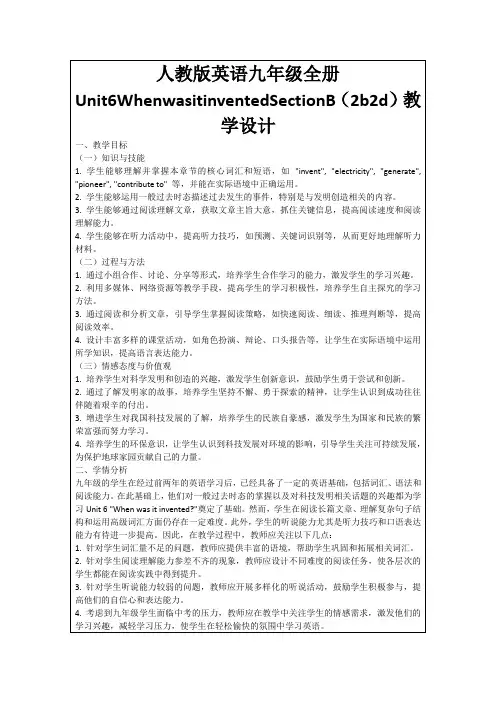
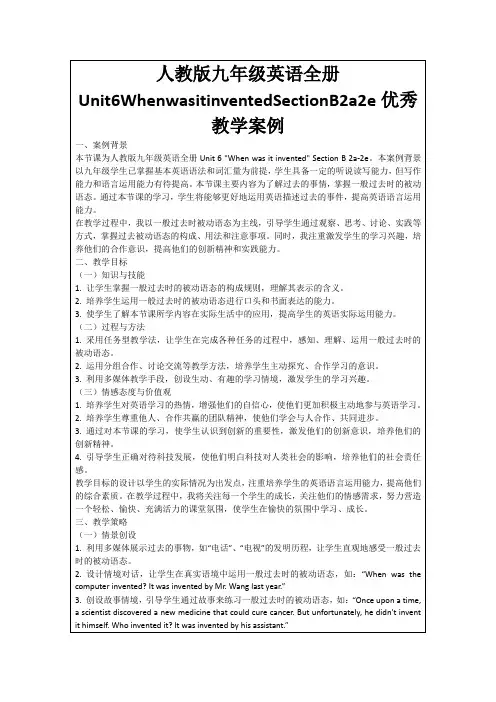
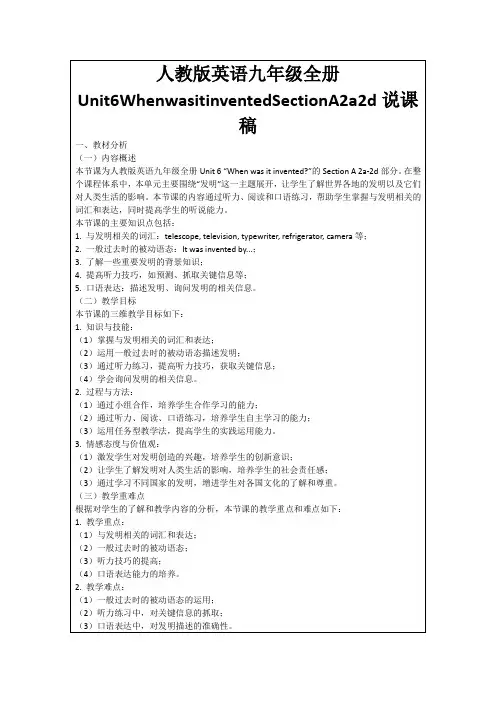
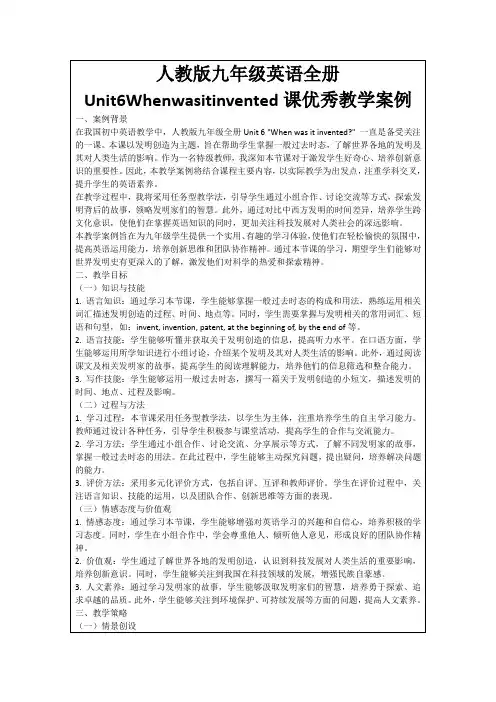
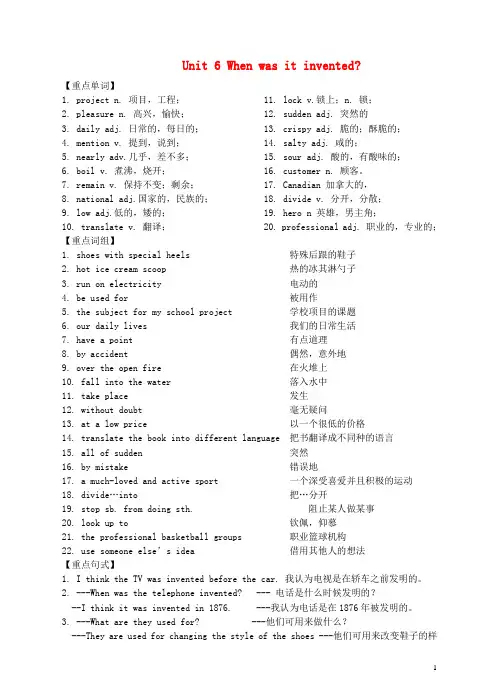
Unit 6 When was it invented? 【重点单词】1. project n. 项目,工程;2. pleasure n. 高兴,愉快;3. daily adj. 日常的,每日的;4. mention v. 提到,说到;5. nearly adv.几乎,差不多;6. boil v. 煮沸,烧开;7. remain v. 保持不变;剩余;8. national adj.国家的,民族的;9. low adj.低的,矮的;10. translate v. 翻译;11. lock v.锁上;n. 锁;12. sudden adj. 突然的13. crispy adj. 脆的;酥脆的;14. salty adj. 咸的;15. sour adj. 酸的,有酸味的;16. customer n. 顾客。
17. Canadian 加拿大的,18. divide v. 分开,分散;19. hero n 英雄,男主角;20. professional adj. 职业的,专业的;【重点词组】1. shoes with special heels 特殊后跟的鞋子2. hot ice cream scoop 热的冰其淋勺子3. run on electricity 电动的4. be used for 被用作5. the subject for my school project 学校项目的课题6. our daily lives 我们的日常生活7. have a point 有点道理8. by accident 偶然,意外地9. over the open fire 在火堆上10. fall into the water 落入水中11. take place 发生12. without doubt 毫无疑问13. at a low price 以一个很低的价格14. translate the book into different language 把书翻译成不同种的语言15. all of sudden 突然16. by mistake 错误地17. a much-loved and active sport 一个深受喜爱并且积极的运动18. divide…into 把…分开19. stop sb. from doing sth. 阻止某人做某事20. look up to 钦佩,仰慕21. the professional basketball groups 职业篮球机构22. use someone else’s idea 借用其他人的想法【重点句式】1. I think the TV was invented before the car. 我认为电视是在轿车之前发明的。
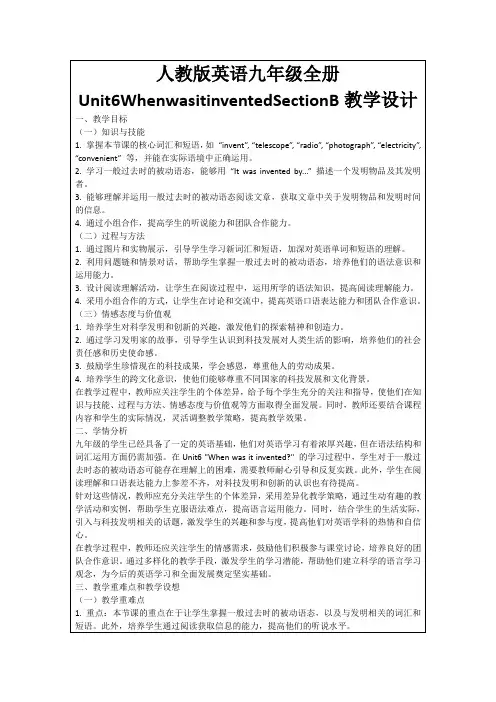
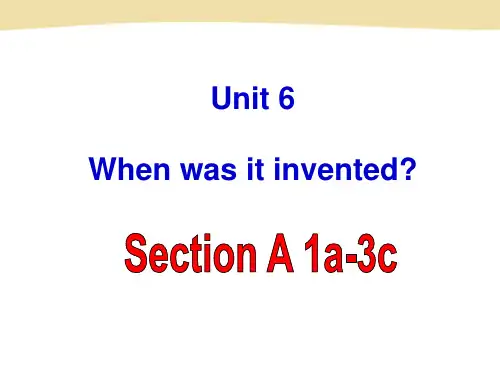
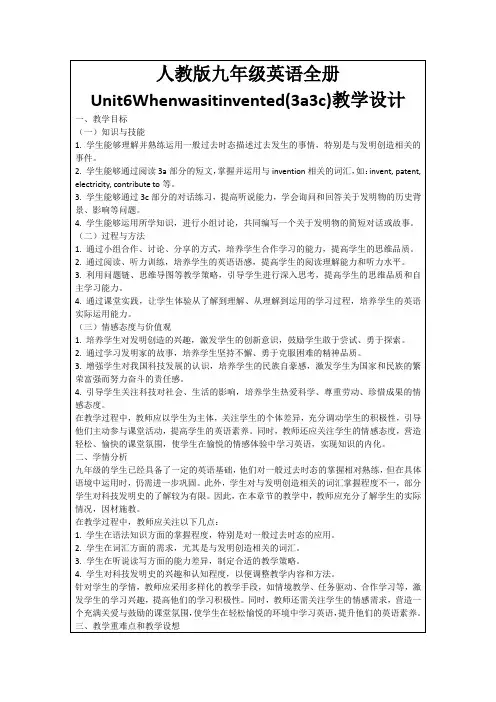
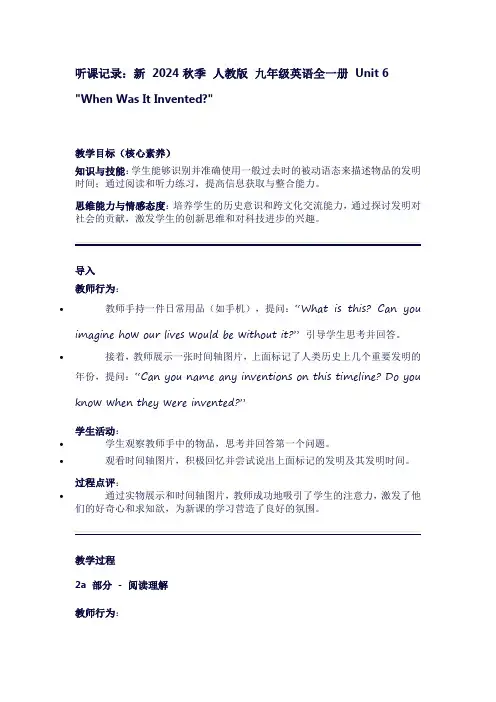
听课记录:新2024秋季人教版九年级英语全一册Unit 6 "When Was It Invented?"教学目标(核心素养)知识与技能:学生能够识别并准确使用一般过去时的被动语态来描述物品的发明时间;通过阅读和听力练习,提高信息获取与整合能力。
思维能力与情感态度:培养学生的历史意识和跨文化交流能力,通过探讨发明对社会的贡献,激发学生的创新思维和对科技进步的兴趣。
导入教师行为:•教师手持一件日常用品(如手机),提问:“What is this? Can you imagine how our lives would be without it?” 引导学生思考并回答。
•接着,教师展示一张时间轴图片,上面标记了人类历史上几个重要发明的年份,提问:“Can you name any inventions on this timeline? Do you know when they were invented?”学生活动:•学生观察教师手中的物品,思考并回答第一个问题。
•观看时间轴图片,积极回忆并尝试说出上面标记的发明及其发明时间。
过程点评:•通过实物展示和时间轴图片,教师成功地吸引了学生的注意力,激发了他们的好奇心和求知欲,为新课的学习营造了良好的氛围。
教学过程2a 部分- 阅读理解教师行为:•引导学生阅读2a部分的短文,要求他们边读边标记出文中提到的发明名称、发明者和发明时间。
•完成后,教师提问几个学生,检查他们的阅读成果,并引导学生总结文章大意。
学生活动:•学生认真阅读短文,标记关键信息。
•积极回答问题,分享自己的阅读理解和总结。
过程点评:•通过阅读理解和信息提取活动,学生不仅锻炼了阅读技能,还加深了对一般过去时被动语态的理解和应用。
2b 部分- 听力理解教师行为:•播放与2a部分短文相关的听力材料,要求学生在听的过程中完成2b部分的匹配题。
•播放结束后,检查答案,并针对错误进行解析和纠正。
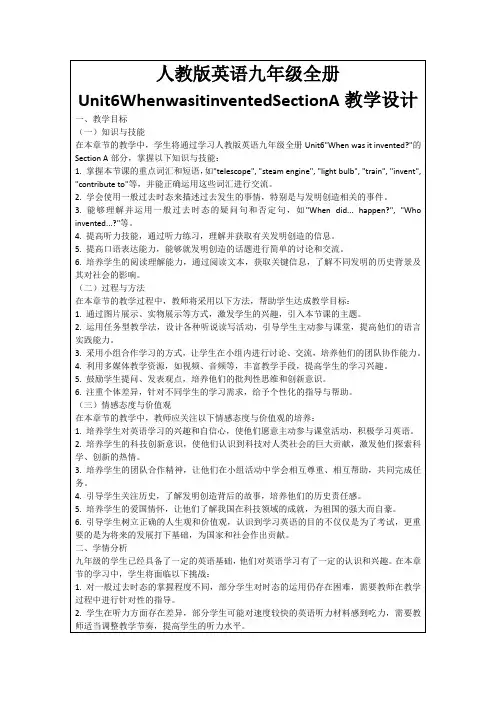
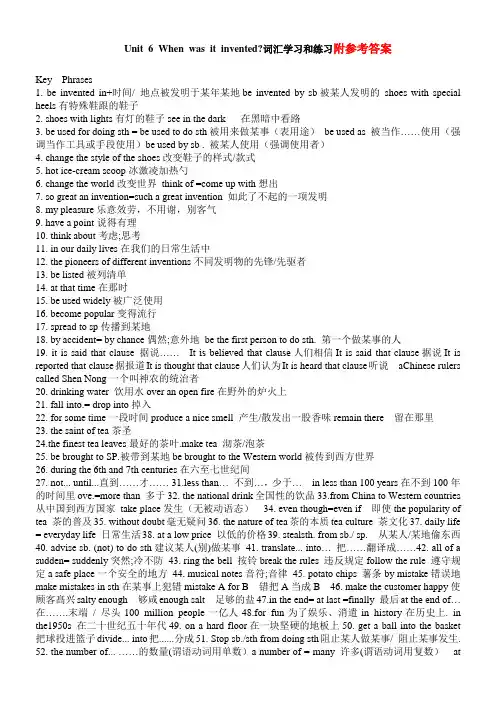
Unit 6 When was it invented?词汇学习和练习附参考答案Key Phrases1. be invented in+时间/ 地点被发明于某年某地be invented by sb被某人发明的shoes with special heels有特殊鞋跟的鞋子2. shoes with lights有灯的鞋子see in the dark 在黑暗中看路3. be used for doing sth = be used to do sth被用来做某事(表用途)be used as 被当作……使用(强调当作工具或手段使用)be used by sb . 被某人使用(强调使用者)4. change the style of the shoes改变鞋子的样式/款式5. hot ice-cream scoop冰激凌加热勺6. change the world改变世界think of =come up with想出7. so great an invention=such a great invention 如此了不起的一项发明8. my pleasure乐意效劳,不用谢,别客气9. have a point说得有理10. think about考虑;思考11. in our daily lives在我们的日常生活中12. the pioneers of different inventions不同发明物的先锋/先驱者13. be listed被列清单14. at that time在那时15. be used widely被广泛使用16. become popular变得流行17. spread to sp传播到某地18. by accident= by chance偶然;意外地be the first person to do sth. 第一个做某事的人19. it is said that clause 据说…… It is believed that clause人们相信It is said that clause据说It is reported that clause据报道It is thought that clause人们认为It is heard that clause听说aChinese rulers called Shen Nong一个叫神农的统治者20. drinking water 饮用水over an open fire在野外的炉火上21. fall into.= drop into掉入22. for some time一段时间produce a nice smell 产生/散发出一股香味remain there 留在那里23. the saint of tea茶圣24.the finest tea leaves最好的茶叶.make tea 沏茶/泡茶25. be brought to SP.被带到某地be brought to the Western world被传到西方世界26. during the 6th and 7th centuries在六至七世纪间27. not... until...直到……才…… 31.less than… 不到…,少于…in less than 100 years在不到100年的时间里ove.=more than 多于32. the national drink全国性的饮品33.from China to Western countries 从中国到西方国家take place发生(无被动语态)34. even though=even if 即使the popularity of tea 茶的普及35. without doubt毫无疑问36. the nature of tea茶的本质tea culture 茶文化37. daily life = everyday life 日常生活38. at a low price 以低的价格39. stealsth. from sb./ sp. 从某人/某地偷东西40. advise sb. (not) to do sth建议某人(别)做某事41. translate... into… 把……翻译成……42. all of a sudden= suddenly突然;冷不防43. ring the bell 按铃break the rules 违反规定follow the rule 遵守规定a safe place一个安全的地方44. musical notes音符;音律45. potato chips 薯条by mistake错误地make mistakes in sth在某事上犯错mistake A for B 错把A当成B 46. make the customer happy使顾客髙兴salty enough 够咸enough salt 足够的盐47.in the end= at last =finally 最后at the end of…在…….末端/ 尽头100 million people一亿人48.for fun为了娱乐、消遣in history在历史上. in the1950s 在二十世纪五十年代49. on a hard floor在一块坚硬的地板上50. get a ball into the basket 把球投进篮子divide... into把......分成51. Stop sb./sth from doing sth阻止某人做某事/ 阻止某事发生.52. the number of... ……的数量(谓语动词用单数)a number of = many 许多(谓语动词用复数)atthe same time 同时53. look up to钦佩;仰慕54.encourage sb. to do sth.鼓励某人做某事not only... but also... 不仅……而且…… e up with = think up 想出56.become an Olympic event成为一项奥运会项目the popularity of … …的流行,普及57.achieve one’s dreams 实现某人梦想58. dream of doing sth梦想干某事一选择题( ) 1.Mo Yan is famous _______ an excellent writer. And China is famous ______ culture.A. for; asB. as; forC. because; asD. as; for( ) 2. --When will A Bite of China II begin tonight?--It ________ for ten minutes.A. will beginB. has begunC. will be onD. has been on( ) 3. Sixteen-year-olds shouldn’t ______ to go to an Internet bar.A. be allowedB. be allowC. allowD. are allowed( ) 4. ---I’m not hungry but thirsty.---________A I’m hungry, too.B What about some cakes?C I’m happy to hear that.D How about a glass of water?( ) 5.— We can use QQ to talk with each other online.— Really? Could you please show me _______ it?A. what to doB. how to doC. when to doD. why to do( ) 6.As we know, _____of us likes pollution.A. no oneB. noneC. someoneD. nothing( ) 7.—Lily, _____ you _____ your ticket?—Not yet!A. did; findB. have; foundC. has; foundD. do; find( ) 8.When we went into the park, we were saw _____ Chinese Kungfu.A. playsB. played C .to play D. playing( ) 9.The invention was Wednesday afternoon.A. invented,inB. invented ,onC. inventing,of D, invent,for( ) 10. --------Remember this , children .________ you study,________ knowledge you will get.--------We know, Mr. Green.A. The harder, the lessB. The hard, the moreC. The harder, the moreD. harder, more( ) 11. Our teacher told us that the eartharound the sun.A. wentB. goC. goesD. would go( ) 12. Our classroom _____ every day, so it’s very clean.A. cleansB. is cleaningC. is cleanedD. cleaned( ) 13. Would you like to tell me _________next, Mr. Feng?A. what should we doB. we should do whatC. what we should doD. should we do what ( ) 14.——How is your grandma? ——She’s fine. She used to _____TV at home after supper. But now she is used to _____out for a walk.A. watch; goB. watching; goC. watching; goingD. watch; going( ) 15.Windows _________ glass,the paper ________ bamboo. A. be made of , be made ofB. are made of , is made ofC. are made of ,is made fromD. are made from., is made of( ) 16. — My dream is to build university on the moon some day.— It sounds likeunusual dream. I wish you could realize it.A. a; aB. an; aC. a; anD. an; an( ) 17. I didn’t think maths _______ important at that time.A. isB. wereC. areD. was( ) 18.nice glasses! Where did you buy them?A. HowB. What aC. WhatD. How( ) 19. Excuse me, would you please tell me ______buy a digital camera on line?A. what to B .how to C. what I can D. how can I( ) 20. Someone says, “Money is everything.” But I think time is _____ important than moneyA. muchB. lessC. much leastD. even more( ) 21 ____ Jack ____ Jim has been to to China, but ___ of them knows little about China in fact.A. Either; or; bothB. Neither; nor; bothC. Not only; but also; neitherD. Both;and; neither( ) 22.We don't know _________ he will come tomorrow._________ he comes,We 'll tell you.A.if;Whether B.whether;Whether C.if;That D.if;If()23.The knife is used ________ cutting.A.for B.as C.by D./()24.—I'm very________ with my own cooking. It looks nice and smells delicious.—Mm, it does have a ________ smell.A.pleasant; pleased B.pleased; pleased C.pleasant; pleasant D.pleased; pleasant ()25.The song came to my ears ________ accident.A.by B.with C.in D.for()26.The meeting ________ last Sunday night.A.happening B.happened C.took place D. takes place()27.Who were the zippers invented ________?A.by B.for C.with D.at()28.—Thanks for the delicious food. —________.A.No, thanks B.That's right C.All right D.My pleasure()29.The corn, potato and tomato are plants that were first ______ in America by Columbus.A.invented B.grown C.discovered D.found out()30.The car ________ by the policeman because the driver was drunk (喝醉的).A.stopped B.was stopped C.were stopped D.stops二完形填空Some years ago, Chinese high school students would show their school-bags, new clothes or new pens to their classmates when the new term started, Today, however, all have 1 .If you still come back to school 2 only these things, you are falling out-of-date(过时). Students in big cities like to bring the latest high-tech things to school, and feel happy and 3 to show off(炫耀) these things to_4_. Mobile phones, MP3 players, CD players, electronic dictionaries, the list is endless.Young people think that, living in the twenty-first century, they must keep up with the _5. They don’t want to fall 6_ . Besides, they think _7_ they need to keep in touch with their classmates, so they need mobile phones. They also like to _8_ the pop music, so they need CD players. They explain that, 9_ like electronic dictionaries, these can be _10 in their study, 11 . They think that their parents should understand 12_ they want these things.Foreign students will also bring some latest high-tech things when they 13to school at the beginning of a new term. _14_ , they often use the money which they made by themselves during the holiday to 15_ these high-tech things that they want.( ) 1. A. changed B. come C. joined D. stopped ( ) 2. A. to B. from C. of D. with( ) 3. A. right B. lucky C. nice D. pleased ( ) 4. A. other B. the other C. others D. he others( ) 5. A. times B. days C. years D. date ( ) 6. A. down B. off C. behind D. back( ) 7. A. that B. how C. if D. which ( ) 8. A. hear B. listen to C. read D. play( ) 9. A. look B. just C. feel D. something ( ) 10. A. new B. modern C. latest D. useful( ) 11. A. also B. too C. either D. then ( ) 12. A. where B. which C. what D. why( ) 13. A. return B. return back C. reach D. arrive ( ) 14. A. But B. However C.So D. Still( ) 15. A. borrow B. buy C. lend D. take三首字母填空。
Unit 6 When was it invented?一.重点短语1.by accident偶然;意外地by mistake 错误地;无意中2.divide …into把…分成…3.take place发生happen发生(没有被动形式)4. change the world改变世界5.all of a sudden=suddenly 突然;猛地6. My pleasure乐意效劳7. It is said that…据说……It is believe that…人们相信……;人们认为……8. drinking water 饮用水9. fall into掉入,掉进,fall off从……摔下来(fell fallen)10. produce a nice smell 散发出一种清香11. without doubt 毫无疑问;12. at a low / high price 低/ 高价13. translate…into…把……译成14. in the end=at last=finally最后15. at the same time同时16. stop /keep/ prevent…from doing sth 阻止……做某事17. look up to 仰慕18. encourage sb. to do sth. 鼓励某人做某事19. dream of 梦想;梦见…20. achieve one‟s dream / 实现梦想one‟s dream comes true21. have a point 有道理22. not only…but also…不但……而且……23. the Olympics 奥林匹克运动会24. come up with 想出25. nearly / almost low/ high pleasure (n.)/ pleasant (adj.)/ pleasedmusic / musical / musician salt / salty custom / customer hero/ heroe s popular /popularity profession /professional accident /accidental Cana da/ Canadian二.重点语法1. 辨析invent; find; find out; discoverinvent“发明”,指通过劳动运用聪明才智“发明/创造”出以前从未存在过的新事物例:Who invented the telephone?He invented a new teaching method.find“找到、发现”,指找到或发现自己所需要的东西或丢失的东西,着重指找到的结果。
Unit 6 When was it invented?各位老师,下午好!今天我说课的内容是新目标英语九年级Unit 6 When was it invented(1a-2c)的听说课教学。
我将从教材分析,听说课的重难点,听说课的思路和策略以及教学步骤四个方面来阐述说明本节课的教学设计思路。
一、教材分析。
Unit 6 When was it invented?的语言目标是”Talk about the history of inventions”。
本节课是围绕话题”Inventions”展开的,运用一般过去时的被动语态谈论与发明物有关的各类信息而展开重点听说技能活动的训练。
本单元的话题与学生的日常生活紧密联系,能激发学生用英语谈论和交流的欲望,因而,有利于培养学生英语口头交际能力,能有效地培养学生对科技历史兴趣,鼓励学生保持对科学发明探索的兴趣。
在上一单元Unit 5 What are the shirts made of中,学生已经学习了使用一般现在时的被动语态来谈论各种生活物品的制造成分及产地。
本节课是本单元的导入课,是对上一单元被动语态结构的巩固和延伸。
本节课中出现了一系列生活有关的词汇,如:heel, scoop, electricity, style, project, pleasure, 其中style, project, pleasure属黑体词,是重点词汇。
同时Section A 部分的1b出现了许多年份的表达,是本堂听说课的重难点之一。
二、听说课的重、难点。
1.重点:(1)学生能够正确运用一般过去时的被动语态”was/were done”以”inventions”为话题谈论发明物的发明者,发明时间以及用途的句型。
(2)复习掌握年份正确读法。
2.难点:(1)在听力中听懂并正确记录年份。
(2)把一般过去时的被动语态熟练运用于口语交际。
三、听说课的思路和策略。
本节课突出的特点是:线性设计,一气呵成,任务一环扣一环,层层递进。
对比一般过去时和一般将来时的被动语态一、构成对比1. 一般过去时的被动语态:was / were + 动词的过去分词如:The teaching building was built six years ago.这座教学楼建于六年前。
2. 一般将来时的被动语态:“will be + 动词的过去分词”或“am / is / are going to be + 动词的过去分词”如:This museum will / is going to be finished next month.这座博物馆将于下个月竣工。
二、否定形式和疑问形式对比1. 否定形式:★一般过去时的被动语态:was / were + not + 动词的过去分词如:The window was not broken by him.窗玻璃不是他打碎的。
★一般将来时的被动语态:“will not be + 动词的过去分词”或“am / is / are not going to be + 动词的过去分词”如:The new film will not / isn’t going to be show n in our city next week.那部新电影下周不在我们城市放映。
2. 疑问形式:★一般过去时的被动语态:通常把was / were置于主语前。
如:Were the textbooks written in 2000?这些课本是2000年写的吗?Where were those buses made?那些公共汽车是哪里制造的?★一般将来时的被动语态:将will, (be going to中的) am / is / are置于主语之前。
如:When will the road be opened to traffic?这条路什么时候通车?Are we going to be asked to attend the meeting?我们会被邀请参加会议吗?【趁热打铁】Ⅰ. 请选出能填入空白处的最佳选项。
1. Many trees and flowers ___________ in our school last year.A. plantB. plantedC. have plantedD. were planted2. It’s said that 215 more new schools ___________ in this city by 2020.A. are buildingB. were builtC. have builtD. will be builtⅡ. 请根据汉语意思完成英语句子,每空一词(含缩写)。
1. 今天下午的会议不在校礼堂开。
The meeting this afternoon ____________________ in the school hall.2. 那座房子是什么时候建的?_________________ the house ___________?Key: Ⅰ. 1. D 2. DⅡ. 1. won’t be held 2. When was; built一般过去时的被动语态练习题一、单项选择。
1. Oh, this is really a big shop. Do you know when it ______?A. builtB. has been builtC. has builtD. was built2. You needn’t clean the reading room now, because it ______ just now.A. cleanedB. was cleaningC. is cleanedD. was cleaned3. —Who is the little boy in the picture?—It’s me. The picture ______ 10 years ago.A. tookB. is takenC. has takenD. was taken4. —Did Jack come to our party yesterday?—No, he ______.A. wasn’t invitedB. didn’t inviteC. isn’t invitedD. hasn’t invited5. The doctor looked over Peter carefully after he ______ to the hospital.A. takesB. is takenC. tookD. was taken二、将下列句子改为被动语态。
1. People built the bridge ten years ago.2. Did someone telephone Sam?3. When did Lu Xun write the book?4. Tim didn’t tell me about it.5. The teacher made the boy read the new words.参考答案一、1—5 DDDAD二、1. The bridge was built ten years ago.2. Was Sam telephoned?3. When was the book written by Lu Xun?4. I wasn’t told about it by Tim.5. The boy was made to read the new words by the teacher.【知识回顾】:被动语态如何变1.什么情况下用被动语态?(1)当我们不知道或没有必要说出动作的发生者是谁时,通常用被动语态。
这种情况下,句子中不带由by引起的短语。
The book is written for children. 这书是为孩子写的。
(2)当动作的承受者是谈话的中心时通常用被动语态。
这时可以带by短语。
This pen was given to me by Tom.这支笔是汤姆给我的。
(3)无必要或不愿说出动作的发出者。
这种情况通常是出于礼貌方面的考虑。
Smoking is not allowed here.这儿禁止吸烟。
2.怎样变主动语态为被动语态把主动语态变为被动语态,可分作三步进行:第一步:找出主动句的宾语,把它作为被动句的主语。
第二步:将谓语动词的主动语态变为被动语态(助动词be+及物动词的过去分词)。
变为被动语态时,时态不要变化。
第三步:将原主动语态的主语(若是人称代词,须变为宾格)放在介词by后边组成by短语,放到句子的后边。
如果我们没有必要说出动作的发出者,by短语则可以不要。
例如:(主动语态)His brother is often helped by him.(被动语态)【被动语态中考真题大练兵】1. —Would you please tell Miss Li that she as a volunteer for the 2008 Olympic Games?—Of course. I will tell her tomorrow.A. chooseB. choseC. has chosenD. is chosen2. We not to play computer games.A. are toldB. have toldC. toldD. tell3. —Could you tell me whom the radio by?—Sorry. I have no idea.A. inventsB. inventedC. is inventedD. was invented4. -Your hometown has changed a lot.—Yes. Take a look at these tall buildings. They last year.A. buildB. builtC. was builtD. were built5. —Did you go to Kang Kang’s birthday?—No, I .A. wasn’t invitedB. didn’t inviteC. am not invited6. An English speech to the children tomorrow.A. is givenB. has been givenC. will be given7. 根据汉语意思完成英语句子:丢失的部件在船拖出水后被找到了。
The lost parts after the ship was of the water.8. She used the knife to cut the fruit a moment ago.(改为被动语态)The knife to cut the fruit by her a moment ago.9. I sent a letter to you last month.(改为被动语态)A letter to you last month.10. 用括号内动词的适当形式填空:The dog (train)to understand different instructions for two years.答案:1~6 DADDAC7. were found; pulled out 8. was used 9. was sent 10. has been trained。